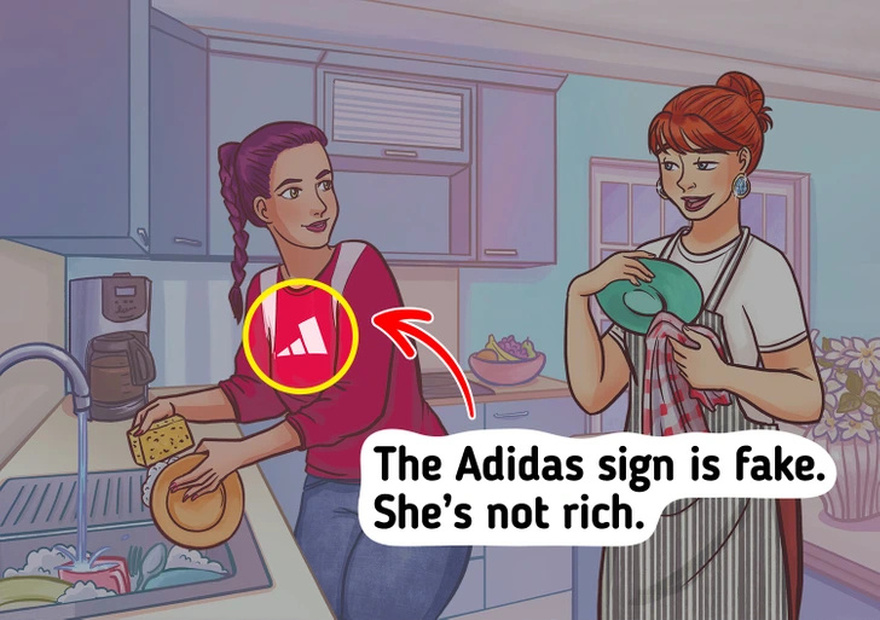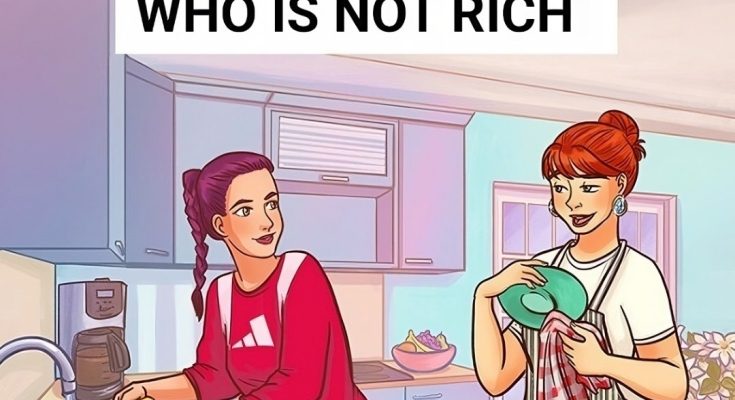We all love a good challenge, especially when it comes to visual puzzles that make us question our observation skills. Imagine this scenario:
We all love a good challenge, especially when it comes to visual puzzles that make us question our observation skills. Imagine this scenario: in a kitchen, two women are chatting while washing dishes. Your task? Figure out which one isn’t rich. Sounds simple, right? But this riddle is trickier than it seems. Many people get it wrong because they miss subtle details. Ready to put your observation skills to the test? Let’s dive in and see if you can crack the case!
Engage Your Mind: The Art of Solving Visual Riddles
Visual puzzles like this one aren’t just fun; they’re designed to enhance your observational skills and critical thinking. The goal is to identify key differences or clues that reveal the hidden truth. Sometimes, what you spot first says a lot about how you analyze information. In this puzzle, the answer is hidden in plain sight—are you prepared to find it?
Overlooked Clues: Often, the answer is right before your eyes, but you might miss it because you’re searching for something more complex.
Irrelevant Details: It’s easy to get distracted by things that have nothing to do with the solution.
Making Assumptions: Basing your judgment on stereotypes can lead to incorrect conclusions.
Subtle Differences: Small details, like a logo or a minor flaw, can be the deciding factor.
Now, let’s break down the scene step-by-step and uncover the clues.
Step-by-Step Guide to Solving the Puzzle
To identify which of the two women isn’t rich, we need to examine the image closely and focus on key details. Here’s how to do it:
Step 1: Observing Their Clothes
One of the first things to notice is what each woman is wearing. The woman on the left has on a red sweatshirt featuring what appears to be the Adidas logo. But hold on—look closely. The logo design is slightly off, with a poorly aligned print that doesn’t match the authentic Adidas symbol, which consists of three clean, diagonal stripes. The flawed design suggests that the shirt might be a knock-off, indicating that she might not have the means to buy genuine branded clothing.
Key Observation: The woman on the left’s fake Adidas logo is a strong clue, hinting that she may not be wealthy enough to afford original brand-name items.
Attention to Detail: Spotting counterfeit branding in clothing can be a subtle but telling sign in visual riddles like this.
Step 2: Analyzing the Kitchen Environment
Both women are doing the same mundane task—washing dishes. While the act itself doesn’t indicate wealth, the kitchen setting can sometimes provide context clues. In this case, the kitchen appears modest, with no visible luxury appliances or decorations that would suggest opulence. Without any distinguishing features in the surroundings, we need to focus more closely on individual elements related to each woman.
Minimal Kitchen Details: The lack of high-end features in the kitchen makes it harder to use the environment to determine wealth.
Focus Shift: Since the kitchen doesn’t offer conclusive clues, it’s best to redirect attention back to the individuals.
Step 3: Checking Body Language and Accessories
Now, let’s examine each woman’s body language and overall presentation. The woman on the right seems more put-together: she’s wearing a clean apron, accessorized with small earrings, and carries a confident smile. Although accessories alone don’t define wealth, her neat appearance and subtle elegance suggest a more refined lifestyle.
Meanwhile, the woman on the left has a more casual and somewhat sloppy appearance, lacking the refinement of her counterpart. Combined with her fake-logo sweatshirt, these factors build a clearer picture of her financial status.
Appearance Matters: The well-dressed woman appears more affluent, aligning with typical indicators of wealth like polished accessories and neat attire.
Contrasting Styles: The woman on the left’s laid-back, less polished style further supports the idea that she might not be wealthy.
Step 4: Putting It All Together
Now that we’ve examined each detail, it’s time to draw a conclusion. The fake Adidas logo is the most definitive clue in this riddle. While it’s possible for someone to wear a knock-off simply for convenience, the design flaw is emphasized in the puzzle to highlight financial disparity. Thus, the woman wearing the fake Adidas sweatshirt is the one who isn’t rich.
Final Analysis: The woman on the left, with the counterfeit logo, is the one who isn’t rich.
Key Takeaway: Authenticity in clothing can be a subtle indicator of wealth, especially when combined with other observations like body language and overall appearance.
The Correct Answer: The Woman with the Fake Adidas Logo Is Not Rich

After a thorough breakdown, it’s clear that the woman with the fake Adidas logo is not rich. The counterfeit logo serves as the pivotal clue, aligning with the riddle’s intent to differentiate wealth through small but telling details. While brand logos aren’t always a definitive measure of wealth, they play a crucial role in this specific visual puzzle.
Encouraging Interaction: What’s Your Answer?
So, did you guess correctly? Share your answer in the comments below! What caught your attention first—the logo, the body language, or something else entirely? Let us know how you approached this riddle and whether you found it challenging. Remember, it’s all about honing your observation skills and having fun along the way!
Conclusion: Keep Solving, Keep Learning
Visual puzzles like this one do more than entertain—they sharpen your critical thinking and observation skills. The next time you tackle a visual riddle, remember to look beyond the obvious and pay close attention to subtle details. Whether it’s spotting a fake logo or interpreting body language, these challenges help us become more perceptive and thoughtful.
So, stay curious and keep challenging yourself. The more you solve, the sharper your mind becomes! Keep an eye out for more intriguing puzzles that test your logic, and most importantly, enjoy the process of discovery.



